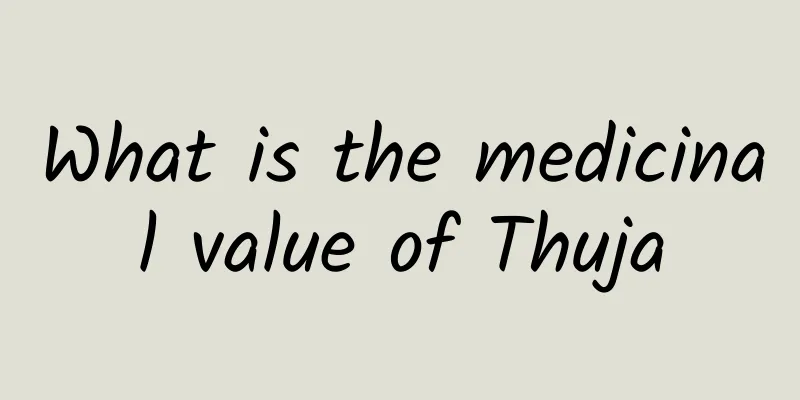What is the medicinal value of Thuja

|
Thuja sutchuenensis is a plant that generally grows in special environments, mainly in areas with very high altitudes. It is wild and has not been artificially cultivated so far. Moreover, the current number is not too large. It is a protected plant with strong medicinal value and is very effective in treating various diseases. So, what is the medicinal value of Thuja sutchuenensis? Let’s learn more about it through the following introduction. 1. Significant anti-tumor effect. It has obvious inhibitory and excellent therapeutic effects on gastric cancer, lung cancer, blood cancer, liver cancer, gallbladder cancer, intestinal cancer, pancreatic cancer, uterine cancer, ovarian cancer, cervical cancer, prostate cancer, breast cancer, brain tumor, nasopharyngeal cancer, laryngeal cancer, esophageal cancer, bone cancer, bladder cancer, skin cancer, lymphoma, and retinoblastoma cells. The mechanism is that the compounds of Thuja orientalis can significantly inhibit the growth and proliferation of cancer cells, induce cancer cell apoptosis, destroy the transcription and replication of cancer cells, enhance the body's immune function, and enable patients to achieve significant improvement and recovery. 2. Treat leukemia. Quercetin, a compound rich in Thuja orientalis, has a strong anti-proliferative effect on leukemia cells, can inhibit the secretion of vascular endothelial growth factor (VEGF) by leukemia cells, promote and induce apoptosis of leukemia cells, and has a significant therapeutic effect on leukemia. 3. Powerful anti-inflammatory, antibacterial and antimicrobial effects. It has strong bactericidal and antibacterial effects on Staphylococcus aureus, Escherichia coli, Proteus vulgaris, Pneumococcus, Tuberculosis, Group A Streptococcus, Catarrhalis, Penicillium, Bacillus subtilis, Bacillus thuringiensis, Shigella dysenteriae, Aspergillus niger, etc. 4. Eliminate free radicals and resist lipid oxidation. The compounds quercetin and tannins rich in Thuja orientalis can directly or indirectly remove superoxide free radicals in the body, precipitate proteins, improve the intracellular oxidation state, and achieve the effects of anti-lipid oxidation and prolonging aging. 5. Anti-oxidation of human red blood cells. The compounds quercetin and tannins rich in Thuja orientalis are extremely effective in inhibiting the reaction of free radicals H2O2 with red blood cells, protecting the red blood cell membrane from rupture, reducing hemolysis and malondialdehyde content, and achieving the purpose of resisting oxidative damage to human red blood cells. Through the above introduction, we know the medicinal value of Thuja sutchuenensis. In addition to the above effects, Thuja sutchuenensis can also play a role in calming the soul and can effectively improve insomnia. In addition, for women, it can promote metabolism to achieve the effect of detoxification and beauty. It can also play a detoxifying and anti-inflammatory effect. |
<<: What are the medicinal values of morels?
>>: What is the medicinal value of yacon?
Recommend
If a bug lands on you, don’t slap it away casually, as it can be fatal!
today, Topic #Don't slap bugs when they land ...
Forest carbon sinks achieve carbon removal and help achieve “net zero emissions”
November 1 is World Afforestation Day. In additio...
The efficacy and function of pig large intestine
As people's living standards improve, they pa...
What are the effects and functions of wild purple Ganoderma lucidum?
Ganoderma lucidum is a relatively precious health...
What is the effect of soaking deer whip and Cistanche in wine?
In daily life, many people use deer penis and Cis...
The efficacy and function of yellow vine leaves
Everyone is familiar with yellow ivy leaves, of c...
This disease is widely hidden in the population, causing great harm, but few people know about it.
The cause of hypochondriasis is still unknown. Hi...
The efficacy and function of Qinghai iris
Qinghai iris is a kind of Chinese herbal medicine...
Traditional Chinese medicine for removing dampness and turbidity
The main Chinese patent medicines for removing da...
The efficacy and function of catfish
The medical value of catfish is beyond our imagin...
Can we keep the “teeth” like the “elephant”?
Whether in the East or the West, the use of ivory...
More than 100 years later, we finally figured out the hierarchy of this flower
In early June this year, I saw Fritillaria thunbe...
Say goodbye to back-to-school syndrome by doing this
Popular Science Times reporter Chen Jie At the be...
Global Science News | Scientists from many countries emphasize that the new coronavirus is not a "laboratory leak"
· Novel Coronavirus· Scientists from many countri...
Side effects of glucocorticoids
Glucocorticoids are not unfamiliar to everyone. P...
![[Smart Farmers] The Yellow River Protection Law has entered the legal track by protecting the mother river](/upload/images/67f0e34e2b08d.webp)
![The efficacy and role of large-leaf green woodruff [picture]](/upload/images/67ca6393f375e.webp)







